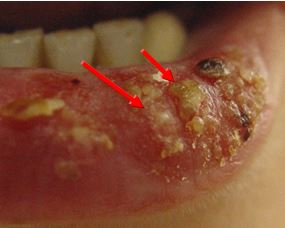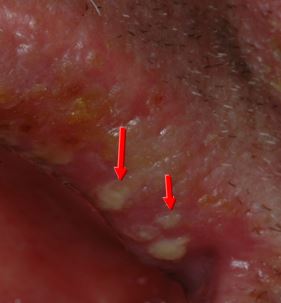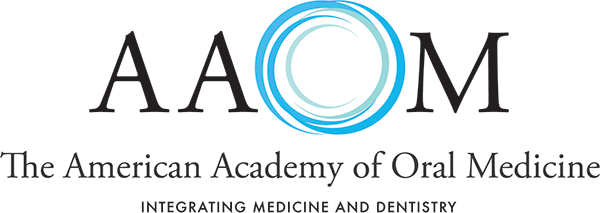Herpes Simplex Virus Infection
Herpes simplex virus (HSV) is a very common and easily transmitted virus. In fact, 80% or more of people have been infected with herpes simplex virus-1. Most of us acquire the virus early in childhood from our parents, relatives, or childhood contacts through normal kissing, etc. Most of the time, the first infection is associated with few or no symptoms, but sometimes primary herpes simplex virus infection can produce mild to severe pain and difficulty in swallowing. Lesions resolve and pain decreases usually after 8 to 16 days.
|
Picture 2. Crusting that appears several days after the initial lesion.
|
 |
|
Picture 1. Blisters or vesicles from early cold sore on lip.
|
 |
After initial infection, the virus remains dormant deep inside the nerves. Many individuals go their entire life without realizing they carry HSV. However, around 20% of those with HSV will have a recurrent infection. Outside the mouth these are known as “cold sores” and are most commonly seen on the lips. It is also possible to have recurrent HSV infections around the nose, eyes, and inside the mouth. In the mouth, these infections appear as small painful ulcers on the hard palate, gums, and the top of the tongue.
Cold sores usually begin as a small cluster of blisters or fluid-filled swellings (Picture 1). These quickly rupture to leave behind open “weeping” sores or ulcers. In a few days, these will begin to crust over and scab (Picture 2). After a week or a little more, the cold sores will heal completely and usually there is no scarring or known long-term effect.
QUESTIONS AND ANSWERS ABOUT COLD SORES
Q: When do people acquire a primary herpes simplex virus infection?
A: Usually in infancy or childhood. However, many people acquire the disease later on when they kiss an infected person during adolescence or adulthood.
Q: What does the initial primary herpes simplex virus outbreak look like?
A: The initial outbreak is most common in children, but can be seen in adults. The initial infection is accompanied by painful sores on the lips, cheeks, gums, and tongue. The presence of lesions can be accompanied by fever and swollen glands under the neck. Swallowing can be difficult and if liquids are not taken, dehydration can result.
Q: What is the treatment for primary herpes?
A. The best treatment is (as with any virus infection) is to ensure adequate nutrition and hydration while it runs its course (usually around a week). If this is diagnosed very early your doctor may be able to prescribe an antiviral medication to shorten this process.
Q: Are cold sores contagious?
A: Yes. They can easily be transmitted by contact from one person to another, including through oral-genital contact. It is also possible to spread the virus from one site to another, such as the eyes, nose, or around the fingernails. You should minimize any contact with the sores. After contact with a cold sore you should wash your hands and be careful not to accidentally touch your eyes or wipe your nose.
Q: What can cause a cold sore breakout?
A: Common causes are exposure to sunlight, cold, wind, stress, trauma, and medications or conditions that impair the immune system such as prednisone, Enbrel or cancer therapy. If you know what triggers a cold sore for you, you should tell your doctor. It may be possible to apply a cream or ointment or take an antiviral pill that can either prevent or abort cold sores in these circumstances.
Q: Is there a cure for herpes simplex?
A: Not yet. The virus remains in nerve cells in the body even between breakouts. In this hiding place, it is difficult to eliminate.
Q: Can anything prevent cold sores if I am getting a lot of them?
A: Sunscreen applied before sun exposure can help prevent the development of cold sores on the lips. It is possible for your doctor to prescribe antiviral medications that may help to reduce the number of cold sore episodes that you experience. Most of these medications are taken by mouth on a regular basis.
Q: Are medications available?
A: Nonprescription agents such as lysine, Carmex, and Docosanol (Abreva) can help reduce virus replication and may speed healing. Lip emollients can help keep the lips moist, but should only be used after the lesion is no longer weeping fluid (i.e., in the scab phase or between episodes). Antiviral medications can be prescribed by your doctor or dentist. These medicines help to reduce the severity and duration of lesions and can prevent the formation of lesions. Prescription antiviral medicines include:
Prepared by the AAOM Web Writing Group
Updated 22 January 2015
The information contained in this monograph is for educational purposes only. This information is not a substitute for professional medical advice, diagnosis, or treatment. If you have or suspect you may have a health concern, consult your professional health care provider. Reliance on any information provided in this monograph is solely at your own risk. |


